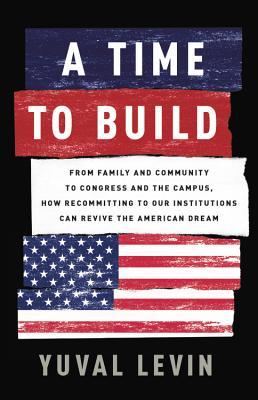What do you think?
Rate this book


256 pages, Hardcover
First published January 21, 2020
I see that back in 2020, I put this Yuval Levin book on my "things to read" list. After four years, I finally got around to getting a copy, via UNH Interlibrary Loan from Brandeis.
Note the publication date: January 21, 2020. So written pre-COVID. Pre-2020 election. Pre-January 6. Levin's book is about decaying American institutions, and it's difficult to believe that things haven't gotten worse.
My procrastination in reading the book may reflect my previous reports on Yuval Levin books. Snips: "Gosh, I wish I'd liked this book better" (The Fractured Republic) and "Yuval's prose is … not sparkly" (The Great Debate). Sad to report this book continues in that vein.
But let's dig out the good: as a self-identified conservative with minimal libertarian instincts, Levin makes the case that a healthy country requires healthy institutions, and all indications are that American ones are becoming ineffective and mistrusted. Those institutions should be transforming their members into subsuming their quirky individualism into reliable defenders of timeless values and virtue.
He runs through some examples of decay: government, in all its levels and branches; professionals (journalists, doctors, lawyers, …); higher education, naturally; social media, also naturally; family, religion, and our local community organizations.
His recipe for mending is in re-recognizing the values of institutions, returning to their traditional values, even if this means sanding off the individualistic tendencies of the people involved. If he recommended any specific tactics for implementing this rebirth, I missed them.
Levin does not entertain the possibility that what we're seeing isn't irrevocable decay and decline into dreary dystopia, but instead a dynamic evolution, shucking off the old, and bumbling and scraping the pieces into something new and different institutions, perhaps better in some ways. We have a long history of pessimism and doomcrying, it's part of our cultural DNA. And so far we have managed to muddle through.
One example of Levin's prose that furrowed my brow came early on, page 16:
Flourishing happens in the joints of society—and this is where the deepest sort of trouble shows itself.
Joints? So society is like a skeleton, and flourishing happens in the parts that … bend?
Or is in "joints" in the sense of "Of all the gin joints, in all the towns, in all the world, she walks into mine"?
I'm stupid, I guess.